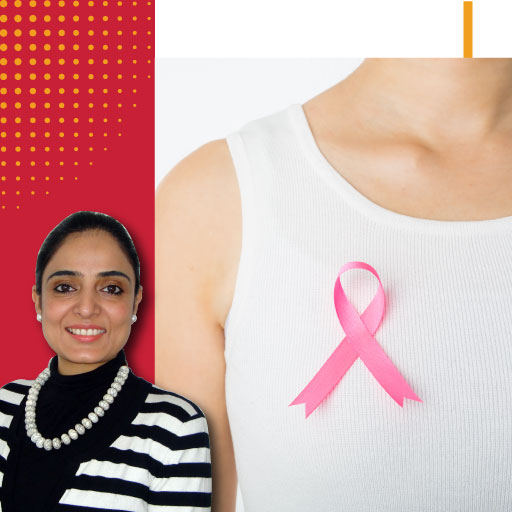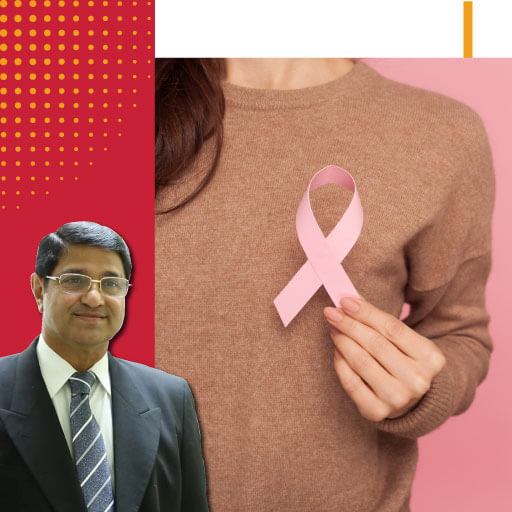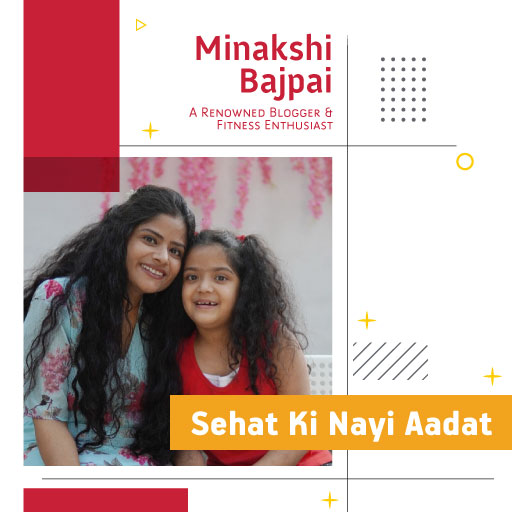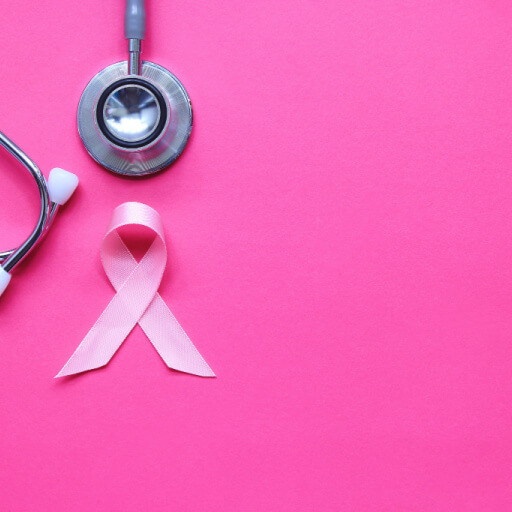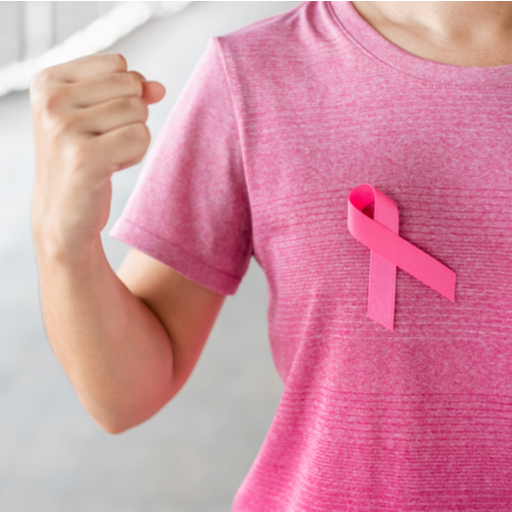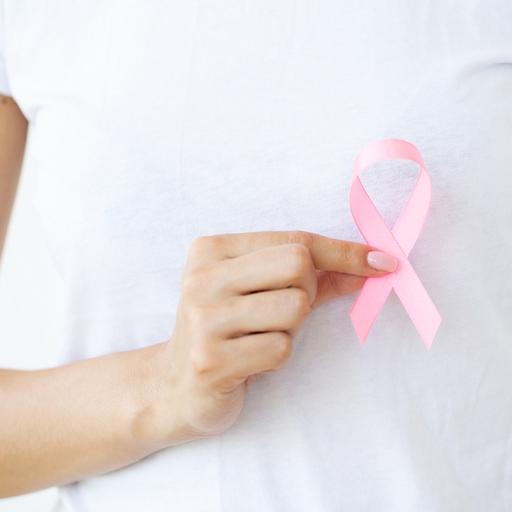A few years ago, 30-year old Pooja visited my clinic with a complaint of a lump in her breast. Her gynaecologist suggested she see an oncologist just to be sure. When we performed a biopsy, it turned out to be breast cancer.
In Pooja’s case, she was lucky that it was caught early and we were able to start treatment immediately. At her age, a lot of women delay seeing a cancer specialist because they believe they are too young to get breast cancer. Often doctors also miss the signs and symptoms in young women because of the perception that cancer is an old person’s disease.
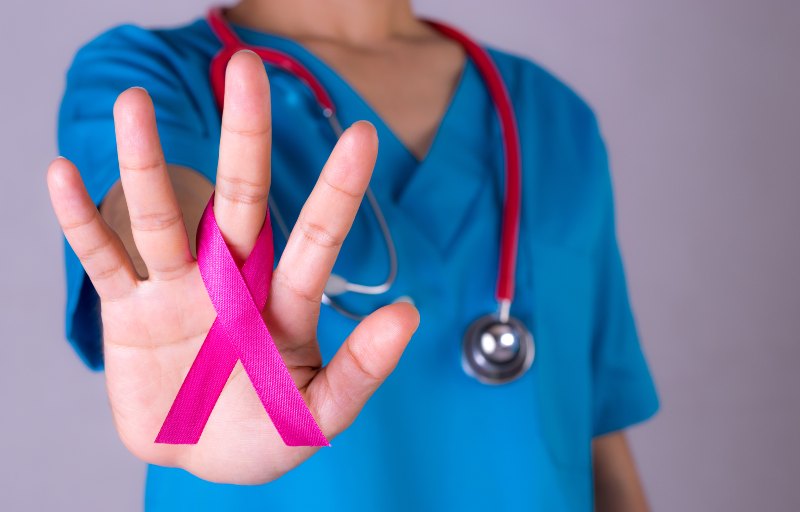
Breast Cancer And It’s Early Diagnosis
Breast cancer in younger often shows more aggressive clinical behaviour with poor outcomes. This is why it is imperative that a woman of any age doesn’t delay seeing a cancer specialist if they notice any lumps, persistent rash on the breasts, unusual redness, discharge from the nipple, a sudden change in the size of the breast, or sudden changes in the appearance of the nipple. This is especially important if there is a family history of breast or ovarian cancer among first-degree relatives (parents, siblings, maternal or paternal aunts). Hereditary breast cancer accounts for about 5-10% of all breast cancers due to mutations in the BRCA1 and BRCA2 genes which get passed onto the next generation. Carriers of the mutation have a 50-85% possibility of developing breast cancer and should undergo routine screening starting at a young via clinical breast exams, mammograms, ultrasounds, and MRIs is recommended. Another option is a prophylactic mastectomy after childbearing is complete, similar to what actress Angelina Jolie underwent.
Every year there are more than 1.5 lakh cases of breast cancer in India. It is the most common cause of cancer in Indian women. The incidence of breast cancer in young women in India is 16% of patients as opposed to only 6 % in the west. Even in 2020 with all the medical advances available, 1 in 2 Indian breast cancer patients still succumbs to the disease. This is because of limited awareness about the disease and late detection.
Women tend to be chief caregivers in families and often prioritize the health of family members, and spouses over their own health. This is definitely more common in India. I have seen many cases of women coming to see me after months and months of ignoring or living with symptoms. Often by the time they make it to see me, the cancer has advanced to late stage. When a patient presents with late-stage cancer, the tumour size is often so large that breast conservation is no longer possible. The disease has spread to the lymph nodes and other parts of the body, and requires intensive treatment. Lack of information, misinformation, fear and ignorance of the disease and its treatment and seeking unproven alternative methods of treatment, all lead to the sad outcomes we see.
Early detection truly does save lives. Breast cancer detected at Stage 1 has a survival rate of close to 100%. The benefits of early detection are manifold. Treatments for early breast cancer are less extensive. Patients can have breast conservation surgery instead of a mastectomy where the breast is fully removed. Saving the breast and having a breast-conserving surgery in select patients, does not compromise survival in any way and has a positive impact on body image and self-esteem. Another benefit of early detection is the possibility of avoiding chemotherapy. If you have a certain subtype of cancer that is hormone-driven, and are in Stage 1 or 2, there is a good chance you are eligible for a prognostic test. A prognostic test can assess your risk of relapse and if it is found to be very low, you can safely avoid chemotherapy. Imagine being able to avoid all the side-effects of chemotherapy and quickly getting back on your feet after your surgery.
For young women diagnosed with breast cancer at an early stage, there is also the possibility of preserving your fertility, so that if you wish, you can go on to having a pregnancy at a time as suggested by your oncologist. Young breast cancer patients should be aware of this and discuss this aspect, actively with the doctor when treatments are being planned
So, what is the way forward as a young woman in India? The first step is to be aware of breast cancer. It can and does happen at very young ages also. If you have a symptom, do seek out a breast specialist or an oncologist. For those who have a family history of breast cancer, you can visit a genetic counsellor to understand your individual risk and what options are available to you. Your doctor may be able to put you on medication or suggest surgeries that can reduce your risk of developing breast cancer.
And finally, all women, irrespective of family history, can take some steps to reduce their risk of developing the disease. These include regular moderate-intensity exercise, maintaining a healthy weight, and eating a diet rich in antioxidants and unprocessed food, breastfeeding, and lowering alcohol consumption can all lower your risk of developing breast cancer.
Your health is in your hands! Self-check, report changes early and don’t let the fear of treatments prevent you from seeking out early intervention. Take charge of your health today with our blogs on fitness and health.





 1800-270-7000
1800-270-7000


